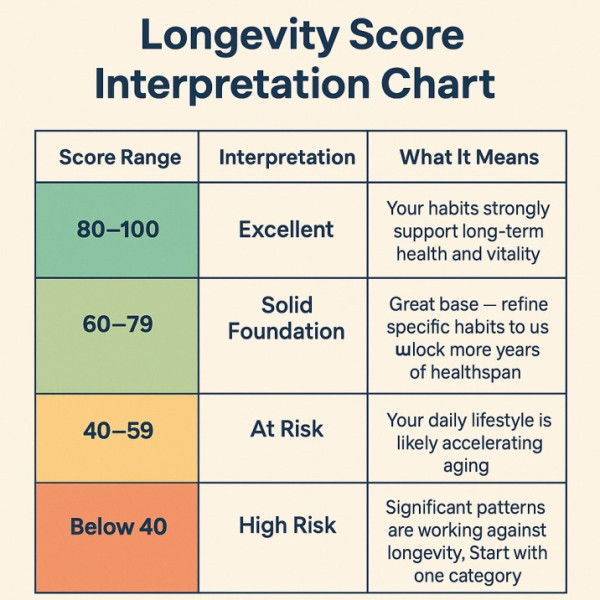Take This 20-Question Longevity Test

How Long Will You Live? Take This 20-Question Longevity Quiz
Only 20 percent of longevity is genetic. The remaining 80 percent is shaped by your daily habits. This 20-question longevity quiz, inspired by Blue Zones research, evaluates your sleep, nutrition, movement, stress, and social connection — the five lifestyle domains proven to extend healthspan.
This 20-question longevity quiz evaluates your sleep, nutrition, movement, stress, and social habits to estimate how closely your lifestyle matches patterns found in Blue Zones. It can’t predict your exact lifespan, but it highlights which daily behaviors are extending or shortening your long-term healthspan — and how to improve them.
What Is This 20-Question Longevity Quiz and How Does It Work?
If you’ve ever wondered how long you might actually live — not in terms of lifespan, but the years you’ll spend healthy, mobile, strong, and mentally sharp — this quiz gives you a surprisingly accurate snapshot.
This 20-question Longevity Assessment is based on decades of research from the world’s Blue Zones — communities where people routinely live to 100 and maintain vibrant health well into their later decades. Rather than focus on genetics or lab biomarkers, the quiz evaluates the everyday behaviors that determine up to 80 percent of your healthspan.
The test measures five evidence-based pillars:
> Movement
These categories mirror the lifestyle patterns shared by centenarians worldwide — the habits that consistently predict longer, healthier lives.
“Only about 20 percent of longevity is driven by genetics. The remaining 80 percent comes from lifestyle — how you sleep, eat, move, manage stress, and connect with others.”
Unlike a blood panel or wearable score, this quiz reveals how your behavior — the invisible architecture of your day — impacts your long-term well-being.
Why Does a Longevity Quiz Matter More Than Any Supplement?
Modern health culture often overlooks the obvious: it’s not peptides, IV drips, or exotic biohacks that keep people alive the longest. It’s lifestyle.
Blue Zones research confirms that community, movement, purpose, and diet predict more years of healthy life than nearly any supplement on the market. Social connection alone can add up to 15 years. Purpose can add seven. Movement built naturally into daily life — not gym workouts, but walking, gardening, lifting, bending — is one of the strongest predictors of late-life independence.
In fact:
> **Loneliness increases mortality risk as much as smoking 15 cigarettes per day.**
> Processed foods, chronic stress, and inadequate sleep accelerate biological aging.
> A strong social circle reduces disease risk more than moderate drinking or exercise.
This quiz highlights those factors — the ones that truly move the needle — and reveals blind spots you may not realize are shaping your health trajectory.
How Does the 20-Question Longevity Quiz Score Your Habits?
You’ll rate 20 statements from 1 (strongly disagree) to 5 (strongly agree). Your total score places you into one of four longevity zones:
Longevity Score Breakdown
The Five Pillars: Your Score Compares You Against
Sleep & Recovery:
7–8 hours nightly, consistent schedule, minimal late-day caffeine, low nighttime stress.
Nutrition:
Plant-forward eating, whole foods, slow meals (“Hara Hachi Bu”), low added sugar.
Movement:
Regular natural movement — walking, stretching, standing, manual tasks.
Stress & Purpose:
Downshifting rituals like meditation, prayer, reflection, and a clear sense of meaning.
Social Connection:
Close family ties, active friendships, community, belonging.
When I (Brent) took the quiz, I scored 62 out of 100 — solid, but with clear weak spots. My lowest areas were strength training consistency, gratitude practice, and maintaining in-person friendships. The quiz didn’t shame me — it showed me exactly where I was aging faster than necessary.
How Should You Interpret Your Longevity Score?
A longevity score isn’t a prediction of how long you’ll live — it’s a map of how your habits influence biological aging.
Here’s what your score actually tells you:
> 80–100:
You’re stacking the deck. Maintain consistency and refine smaller areas.
> 60–79:
You’re doing many things right. Choose one pillar to level up next.
> 40–59:
You’ve got a strong room for improvement. Pick one habit and start small.
> Under 40:
This is the wake-up zone. Begin with sleep and social connection — the two fastest ways to reverse damage.
Your score is not fixed. You can meaningfully improve it within weeks.
How Is This Longevity Quiz Based on Blue Zones Research?
Blue Zones — Okinawa, Nicoya, Ikaria, Sardinia, and Loma Linda — share a unique pattern of lifestyle behaviors known as the Power 9. These include natural movement, plant-forward diets, moderate alcohol intake, maintaining purpose, and belonging to a social group.
This quiz maps directly onto that research:
> Movement questions → Move Naturally
> Purpose & Stress questions → Downshift + Purpose
> Nutrition questions → Plant Slant + Hara Hachi Bu
> Social questions → Right Tribe + Loved Ones First
> Sleep questions → Slow living + circadian alignment
It’s not a trend — it’s a data-driven longevity framework.
What Should You Do After You Take the Longevity Quiz?
Improvement is simple: identify your lowest-scoring category and make one small change this week.
Here are three high-impact, easy-to-implement habits:
1. Prioritize Restorative Sleep
Get 7–9 hours nightly, avoid screens before bed, and cool your room to 65°F. Sleep increases hormone balance, metabolic efficiency, immune strength, and brain repair.
2. Eat High-Quality Protein and Whole Foods
Aim for 1.2g of protein per kilogram of body weight daily. Add fiber, healthy fats, and reduce ultra-processed foods.
3. Build Social Capital
Schedule face-to-face time with friends. Join a local group or volunteer. Social connection boosts immunity and can halve your risk of early mortality.
Bonus: Cold exposure (2–3 minutes daily) activates brown fat and reduces inflammation — a powerful longevity lever.
Longevity is a long game. Every habit you add moves the scoreboard.
What I Learned From My Own Longevity Score (From Brent)
My 62/100 score wasn’t discouraging — it was clarifying. I realized I was exercising and eating well, but ignoring community and stress downshifting. So I started small:
> called my best friend once a week
> joined a local group
> added a nightly gratitude journal
My score didn’t just go up — my overall life felt lighter.
Longevity isn’t built in labs and pills.
It’s built through the rituals we repeat each day.
One habit at a time, one year at a time, one life at a time.
If you're a longevity practitioner helping clients transform their habits, our sister company built Clinic OS — a complete marketing and retention system trusted by top longevity clinics. Learn more at Longevity Clinic Marketing.
FAQs About Longevity Quiz
How accurate is this longevity quiz?
It’s not a medical diagnostic tool, but it is grounded in validated lifestyle research from Blue Zones and global aging studies. It’s best used to identify habits that meaningfully impact health span.
What’s the biggest longevity factor people overlook?
Social connection. Strong relationships and community support add more healthy years to life than nearly any other lifestyle variable.
Can I really lower my biological age with lifestyle changes?
Yes. Improvements in sleep, nutrition, stress management, and movement can reverse biological aging markers within months.
How often should I retake the quiz?
Every 3–6 months. This lets you measure which new habits are sticking and which need reinforcement.
Disclaimers
Medical disclaimer:
Content is for educational purposes only and is not medical advice. Always consult a qualified healthcare professional before making changes to your health regimen.
Affiliate disclosure:
Spannr may receive compensation when you click partner links and make a purchase. As an Amazon Associate, we earn from qualifying purchases.
HIPAA/PHI notice:
Do not send personal medical information to this inbox. Spannr does not collect or store PHI via email.
About the Author
Sign Up For Our Newsletter
Weekly insights into the future of longevity

